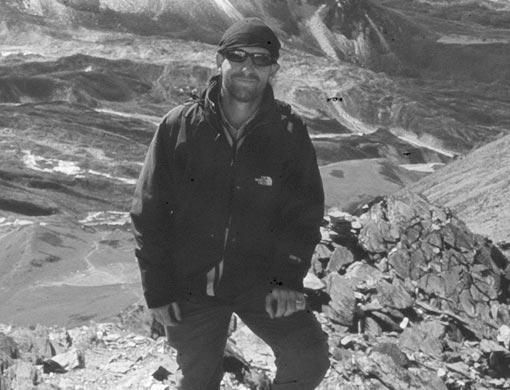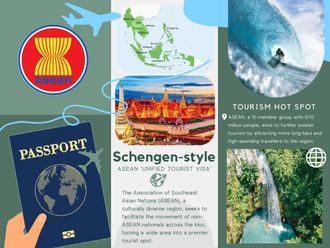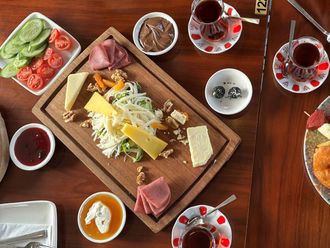Roaming the world, writing travel guidebooks. Sounds like a dream job, right? Not when there are rats in your sleeping bag, says Bradley Mayhew.
You're sitting at a groovy cafe in Kathmandu, enjoying a banana pancake. At the next table, a bearded backpacker is busily sketching a map. After completing this, he then starts copying down bus timetables from a leaflet. An overenthusiastic traveller, perhaps? Or is he a travel guidebook author?
Sometimes scorned but mostly adored by travellers, guidebook authors have the power to adios a hotel from a guidebook, warn travellers of shysters or send them on a punishing trek just to see a pile of historic rubble.
One such scribe is Bradley Mayhew, who has contributed to over 25 books for Lonely Planet publications, including those on Tibet, Central Asia, China, Nepal and Bhutan. But when he's on the road, like a caped crusader he doesn't reveal his true identity to other travellers.
"Generally I don't mention it because the attention can be a bit much. People often realise something's up when I start asking ridiculously detailed questions and writing everything down in a little notebook. Most people ask how they can become a Lonely Planet author. I have one friend in England who is still convinced I'm a spy."
Mayhew's inspiration to travel came while studying Chinese at university in the UK. As part of a bet, he and two mates raced each other to Tibet in 1990.
"Studying Chinese at Oxford can be pretty dry at times (lots of 4th-century Chinese poetry) so one night after a couple of beers I challenged two classmates to a wager. The first person to get to Lhasa after the end of term would get a crate of beer from the others."
By the time others were in western China, Mayhew was already in Tibet.
"The first guy got waylaid somewhere outside of Kashgar. The second made it as far as a truckstop in southern Qinghai and was leafing through the half-Chinese, half-English menu when he suddenly let out a groan.
"A spider-like English scrawl in the margins, next to the entry for potato chips, corrected the mistranslation: 'This is actually boiled potatoes.' He recognised my writing. I'd been there two days before. I never did get that crate of beer, though."
Before becoming a travel writer, Mayhew worked at a Chinese travel agency in London and led tours for an adventure travel company in China and Pakistan. But while working at a Beijing hotel, he received a very unique job offer.
"The wackiest job I've ever had was setting up an office for a sleep-derived US businessman who was trying to introduce the Muppets to China. He approached me to help him translate and keep an eye on his Chinese partner, who he felt was trying to cheat him."
While still working at the hotel, Mayhew would call in sick every morning, creep out the back door then zip around Beijing in the businessman's BMW, visiting film studios and Chinese government offices. He then quit the hotel job and took a room in another luxury hotel.
"Within a week he'd returned to the States, wired $40,000 to my personal account, given me $1000 as a 'clothing allowance' and I was once again in a five-star hotel, only this time as a guest not an employee.
"As far as I could make out, my duties were limited to looking like a foreigner (I was good at this), buying a fax machine and watching Chinese films for potential future screening in the US. The real office manager arrived after a month but it was a wild ride while it lasted."
After joining Lonely Planet, Mayhew soon found himself reviewing hotels and guesthouses in Asia and beyond. But not all of them made it into the guidebooks. "I once slept in a cupboard full of unwashed plates in a commune in Nicaragua once; that was pretty uncomfortable."
Mayhew says he also bunked down in a chapel in a Tibetan monastery in Kham "where rats kept jumping off the altars onto my sleeping bag. I eventually moved into the corridor and woke up in the middle of morning prayers."
"I was in Gonder in Ethiopia during the Timkat festival a couple of years back. Everything was booked solid, except for one hotel which oddly enough had plenty of rooms (this should have raised my suspicions).
"I was travelling with my wife, who is considerably tougher than I am, and I'll never forget the moment she came back from the shared bathroom, sat on the bed and burst into tears. Never a good sign."
However, despite the dodgy hotels and other trials, Mayhew says it's not such a bad gig.
"I'm not going to moan to you that writing guidebooks is actually a terrible job; it's not. The best thing is two or three times a year you get the chance to take four months to explore in detail a small corner of the world.
And with Lonely Planet you never quite know what's coming up next; you could get an email out of the blue suggesting a research trip to Yemen or St Petersburg, you just never know.
"The reality? Well, long days on the road followed by long days and nights chained to a desk, for not much money, that's a given. Also any job that requires you to be on the road for five months of the year stretches relationships and friendships to their limits."
Mayhew, who is based in Montana, says guidebook authors have to be comfortable travelling and working solo for weeks at a time.
"After a while it can be hard to keep the definition between travel for work and travel for pleasure. Whenever we go on a holiday, my wife confiscates my pens and notebooks, otherwise I start drawing maps when I'm supposed to be having fun.
Unlike being a carefree wanderer, his job includes many mundane tasks, he explains.
"The low points for me are almost always at the bus stations. It's hard enough fighting your way to the front of a formless queue and prising out information on a single destination.
"Try asking about a second bus headed in completely the opposite direction and most ticket sellers get very confused. When I then ask about another ten destinations they assume I'm deranged and wave me away.
"Still, it's a great job. I've been paid to trek across Tibet, research Islamic architecture in Central Asia and research cake shops in Kathmandu. You just can't beat that."
But when his secret identity is sprung, what then?
"People are generally excited to meet someone they feel shares their passion for travel," he says.
"Every now and then someone comes up to complain that the hotel I wrote about three years ago has changed its phone number - they seem to hold me responsible somehow!
"Most people are really helpful with pointing me to new hotels or restaurants but there are always a few along the lines of, 'I went to this fantastic restaurant in Kathmandu, you should really put it in the guidebook, dude. It's called, like, the 'something yak'. Or maybe it was a yeti... no, that was the other place... anyhow, it's in the centre of the city...
I can't remember where.
But, hey, you should totally put it in the guidebook!' I love those."












